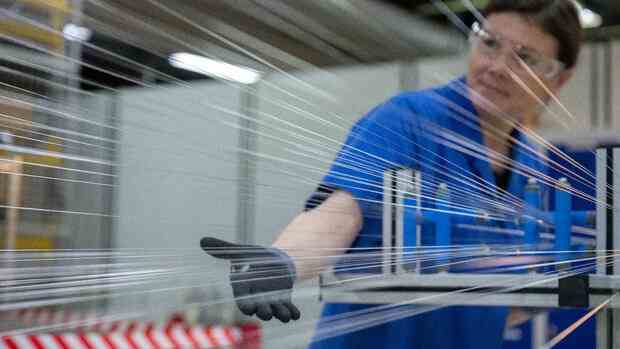Concerns about de-industrialization should not be downplayed.
(Photo: dpa)
The backbone of the German economy is known to be small and medium-sized enterprises. According to a study by the Institute for SME Research at the University of Mannheim, the 26 largest family businesses created a good 267,000 new jobs in Germany between 2011 and 2020, while the 26 DAX companies without a dominant family only created around 48,000. In total, family businesses employ around eight million people.
Not only the “secret world market leaders” stand for well-paid jobs. Preserving these jobs in Germany should be the overriding goal of politics. Our prosperity cannot be maintained without family businesses and the generated tax and social security contributions.
It is therefore all the more worrying that politicians are not only ignoring the continuing downward trend in location quality, but that the discussion is being dominated by calls for further deterioration.
The quality of Germany as a business location has been declining for years. The tax burden is increasing, the infrastructure is deteriorating, energy costs have been significantly higher in Ukraine than in other countries, and not just since the war.
Top jobs of the day
Find the best jobs now and
be notified by email.
Digitization remains an election campaign slogan of politicians who otherwise apparently rely on fax machines. The subjective impression of the decline is confirmed by studies such as the recently published ZEW location ranking. No country has developed as badly as Germany, and with 18th place out of 21, the alarm bells should be ringing instead of just ringing.
Beware of deindustrialization
The issues of infrastructure, bureaucracy, energy costs and tax burden stand out particularly negatively. One would now expect politicians to set about improving these fundamentally important location factors. But far from it. The prevailing belief is that the economy can be resilient at will.
Daniel Stelter is the founder of the discussion forum beyond the obvious, which specializes in strategy and macroeconomics, as well as a management consultant and author. Every Sunday his podcast goes online at www.think-bto.com.
(Photo: Robert Recker/ Berlin)
Concerns about de-industrialization are dismissed as a “bogeyman” that only serves to “pump money out of politicians’ ribs,” according to Marcel Fratzscher, one of Germany’s best-known economists.
In a guest article for the Handelsblatt, he explained that deindustrialization is only a risk if “the German economy continues to oversleep the ecological transformation and digitization”.
The state can intervene here and ensure that companies “do not approach these issues too hesitantly”. In view of the blatant failures of the state with regard to its own areas of responsibility, this is a daring thesis.
>> Read here: Guest article Marcel Fratzscher – Is Germany now threatened with deindustrialization? Four reasons clearly speak against it
On top of that. In a different context, Fratzscher, like politicians in the SPD and the Greens, sees the urgent need to reintroduce wealth tax and abolish exceptions to inheritance tax in the interests of justice.
Since there is little to suggest that income tax would be reduced in return, Germany then took last place in the ZEW location ranking when it came to taxation.
future abroad?
Energy costs are also likely to go down further. Despite the high electricity prices, Germany still occupies 18th place. In view of the government’s refusal to noticeably extend the service life of the existing nuclear power plants and to promote domestic gas, a further deterioration is foreseeable here as well.
For years, companies have been investing less in Germany and more abroad. Industrial production, which accounted for 25 percent of economic output in 2015, now only accounts for 19 percent. Other countries such as the USA were able to increase their share of industry in the same period and are now enticing with attractive general conditions and subsidies.
In this environment, anyone who downplays or denies the danger of de-industrialization underestimates the companies. These are by no means oversleeping, but wide awake when it comes to the future. For more and more that future lies abroad.
Daniel Stelter is the founder of the discussion forum beyond the obvious, which specializes in strategy and macroeconomics, as well as a management consultant and author. Every Sunday his podcast goes online at www.think-bto.com.
More: Industry is investing more in innovations again – but one industry is lagging behind
